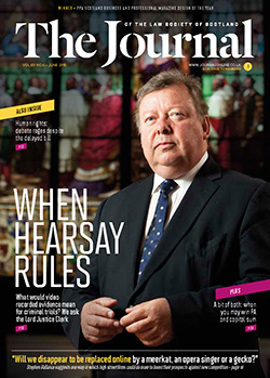Keep up the payments

Traditionally, many family law practitioners have been of the view that if payment of a substantial capital sum was awarded to a spouse, there was little prospect of an award of periodical allowance. In assessing potential claims for periodical allowance, there has been a tendency to focus on s 9(1)(d) of the Family Law (Scotland) Act 1985, which provides for such financial provision as is reasonable to allow a dependent spouse to adjust to the loss of support, over a period of not more than three years from the date of divorce.
However, some recent case law has revealed instances where awards of periodical allowance for significant periods have been made in addition to substantial capital sum payments. It has also shown a focus on the need to provide suitable accommodation for the children (a factor referred to in s 9(1)(c) and s 11(3) rather than s 9(1)(d)), when examining and taking decisions on the level of periodical allowance to
be awarded.
This pattern is illustrated in the three recent cases of M v M [2014] CSOH 136, Parker v Parker [2014] CSOH 159, and W v W 2012 FLR 99.
M v M
In this case, arguments were advanced on all factors from (b) to (e) of s 9(1) of the Family Law (Scotland) Act 1985.
The couple married on 14 February 1992 and separated in September 2012. They had three children. They agreed that the wife would transfer her interest in a farming partnership to her husband and that he would pay the children’s school fees. Both parties claimed there should be a departure from equal sharing. The total value of matrimonial property was £740,723, with £675,543 in the name of the wife and £65,180 in the name of the husband.
The wife’s argument for unequal sharing was that there were significant assets, with a gross value of £717,516, which derived from non-matrimonial sources applied by her. Special circumstances applied and sharing should be 90%-10% in her favour.
The husband had acquired gifted and inherited property during the marriage which was worth in excess of £5.3 million. He did not seek a payment from the wife.
The judge was not overly persuaded by the wife’s economic advantage argument under s 9(1)(b). However, he was significantly swayed by the s 9(1)(c) argument, that there should be unequal sharing of matrimonial property on the basis of a capital requirement to purchase a suitable home for herself and the children, in that the burden of caring for the children would fall on her. Considering the amount of the award and current resources, he took the view that a fair award would be an additional £250,000.
In relation to the claim for continuing financial support, the judge took the view that serious financial hardship would be minimal. However, it was acknowledged that the wife required to adjust to a financially independent lifestyle. He was persuaded that payment of a capital sum would be insufficient. However, once the capital sum was paid, this would relieve the burden of paying rent. Allowing time to make arrangements, £2,000 per month would be payable for a year, and then reduce to £1,000 per month for a further two years.
Accordingly here is a situation where not only is a capital sum paid, but as it was viewed as insufficient, periodical allowance was to be paid for a further three years.
Parker v Parker
This case effectively revolved around a farming partnership which had undergone reorganisation between the parties marrying in 1996 and separating in December 2011.
The wife was seeking a capital sum of £800,000, periodical allowance of £1,500 per month for three years, and £1,500 interim aliment. The husband was paying £1,050 in respect of financial support for the two children, who were aged 14 and 11 at the time of proof. A detailed joint minute was lodged and all the financial matters were agreed apart from the value to be attached to the farm land.
Quite a lot of the evidence concerned the competing valuations put on the farm land by the parties’ various experts. The judge, Lord Brailsford, was critical of the differences in approach, on the basis that they presented the court with a difficult exercise. He indicated that in future cases where there is a significant divergence of expert opinion, he intended to compel valuers to have meetings prior to proof to ensure the problem was not repeated. Clearly the divergence of opinion increased the length of the proof and the expense to the parties.
Ultimately, he decided that only one half of the farm was matrimonial property; that whilst special circumstances had been established in the husband’s favour, the wife had suffered an economic disadvantage as a result of her efforts on the farm, and the husband had acquired an economic advantage; and that having regard to the extent of the matrimonial property, equal division achieved the objective of fair sharing.
Lord Brailsford also took the view that the resulting capital sum of £348,000 was not sufficient, and ordered additional periodical allowance of £500 per month, over and above the £1,050 per month that was being paid for the children. The period of time over which financial support was paid is not clear from the judgment, although it looks as if it was between two and three years.
As well as being an example of the increasing case management which Lord Brailsford is introducing to family actions, this is another example where periodical allowance was awarded in addition to payment of a substantial capital sum.
W v W
This case dealt with periodical allowance on its own.
The parties married on 15 September 2001 and separated on 7 February 2006. They had a child who was almost 10 when the decision was issued in June 2012. Whilst the couple had small pension provisions, there was no other capital which formed matrimonial property.
Prior to marrying, they had agreed that the wife should give up her employment. She returned to part-time employment as a care assistant in 2009. She was studying for a nursing degree on a distance learning basis; this would be completed in 2015. She was unlikely to be able to return to work full time until the child was 16, due to the long shifts she required to undertake. At the time of the proof the husband was in full time employment with an annual income of about £94,000.
The wife sought periodical allowance up to the child’s 16th birthday. The husband had been ordered to pay interim aliment to the wife in the sum of £1,000 per month. In addition he paid support for the child through the Child Support Agency. He argued that he had paid over £80,000 to the wife since separation and it was not appropriate to make any further payment. In considering s 9(1)(c) the court felt compelled to have regard to the interim aliment order.
There was clear evidence that the wife had enjoyed a good income prior to marriage, and that returning to that type of employment was not possible as she had no relatives living nearby for support and she relied on her husband, and occasional help from friends, to assist with childcare.
Consideration also had to be had to s 11(3)(c), as the wife had continued to provide the child with continuity of accommodation. Accordingly there was a need to provide suitable accommodation for the child.
The court also considered s 9(1)(d) and the factors at s 11(4), particularly (b) and (c), which deal with the duration and extent of dependency prior to divorce and any intention to undertake a course of education or training.
The sheriff was satisfied that the wife had lived frugally since the parties’ separation and that her financial position improved when there was an award of interim aliment. In the circumstances, the sheriff awarded periodical allowance, to be paid at the higher rate of £1,000 per month for 18 months and then at £500 per month until September 2018 (when the child was 18).
Longer-term view
Previously there was a view amongst practitioners that whilst periodical allowance (continuing financial support) was part of the options available, it did not feature significantly, and if periodical allowance was to be paid it would not be for anything like three years. These recent cases demonstrate that even if there is a significant capital award, periodical allowance can be paid for three years. W v W indicates that if there is little or no matrimonial property, periodical allowance can be paid for longer than the three year period. This has come about by considering periodical allowance in the context of s 9(1)(c) and in particular s 11(3)(c), the need to provide suitable accommodation for the children.
It is important to remember that periodical allowance remains an option available in addressing fair financial provision where a wife continues to have the significant financial cost/burden of caring for children.
In this issue
- Weighing the risks
- Private parking fines – are they enforceable?
- Scotland – home of (dangerous) golf
- Shareholder details: the right to refuse
- Perils of the owner-occupied croft (fuller version)
- Reading for pleasure
- Opinion: Thomas Ross
- Book reviews
- Profile
- President's column
- Land Register completion: one year in
- People on the move
- Rights: whose final say?
- The word on the street
- Screen test
- Making the best of mediation
- Keep up the payments
- The right priorities
- When reputation is not enough…
- Sports justice – being seen to be done?
- Source of disputes
- CML Handbook: the new deal
- Perils of the owner-occupied croft
- In-house and in-tune in the Commonwealth
- Stair Society seeks new blood
- New Build Standard Clauses revised
- Law reform roundup
- Leven's last hole rarely in benevolent mood
- Year of the new look
- AML just became simpler
- "My time is valuable!" Oh really?
- Learning opportunity
- Ask Ash
- Technology: slave or master?






